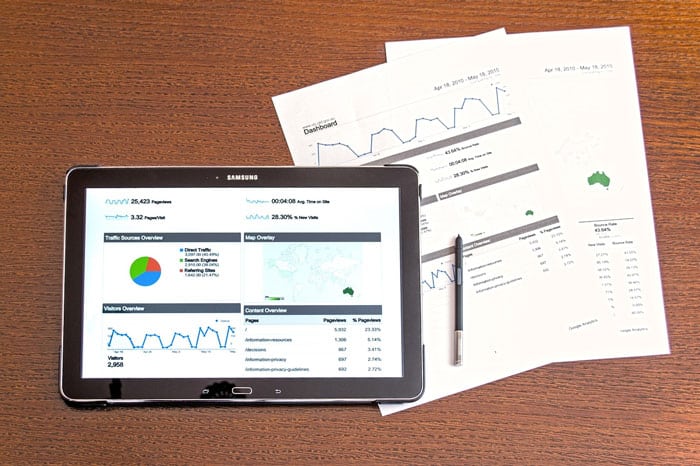
Supply Chain Analyst Job Description, Key Duties and Responsibilities
If you need to know what the job description of a supply chain analyst is, this post will help you with such information, including the requirements you may need to meet to be considered for the position with most employers or recruiters if you are seeking to work as a supply chain analyst. Please, read on:
What Does a Supply Chain Analyst Do?
Supply chain analysts are responsible for examining workflow and utilizing analytical and quantitative methods to understand, predict, and streamline business processes, and enhance supply chain processes.
Their job description entails a series of activities, including assembling of data, analyses of performance, and identification of problems, as well as developing recommendations which support supply chain management planning and operations.
The goal of the supply chain analyst is to help the business increase cash flows, inventory turns, and employee productivity.
They work in various sectors where there is a need to transport goods. This includes: manufacturing companies, retail businesses, and logistics service providers, etc.
Supply chain analysts are responsible for data mining and analysis to understand and illustrate best practices in stock placement optimization, process development, and developing various logistic plans in order to enhance the distribution of goods.
Their role involves partnering with several cross functional teams, including (Logistics, MIS, Merchandising, & Operations) to assist, influence, and recommend solutions that identify root cause analysis and improve process development.
They also provide analytical and system support for the development, implementation, and management of strategies and policies.
Supply chain analysts utilize historical sales in combination with data on trends to generate supply plans and forecast product flow.
They also responsible for executing purchase orders based on supply plan, following requirements and ensuring the smooth flow of goods into multiple distribution centers.
They are responsible for regularly providing analysis of supply chain data to ensure key performance indicators are met; and making recommendations for process improvement.
They assist in development of business tools and processes to capture and monitor metrics for supply chain processes.
They actively partner with various business stakeholders in logistics, DC operations, and MIS, and various internal organizations to drive efficiency with technology, and conduct analysis using various internal software applications that lead to optimal suggestions for supply chain network system enhancements.
The supply chain analyst work description also entails coordinating and implementing warehouse and supply chain best practices.
It also involves undertaking minor project management activities.
The analysts are responsible for maintaining solutions as it relates to the customer agreement, and may recommend and implement changes to improve efficiency, provide cost savings or reduce support.
Their job sometimes requires customer interactions and representing the company in customer meetings.
Depending on the business of the company where they are employed, they are responsible for managing transportation management business processes including shipment route plan optimization and execution to ensure that the organization’s solutions are meeting customer requirements.
They could also initiate stock transfer orders and movements of assigned parts/ reparable parts between various locations.
To become a supply chain analyst requires a Bachelor’s Degree in Supply Chain, Logistics, Business, Industrial Engineering, or Information Systems.
However, employers usually prefer a Degree in Business Administration, Logistics and Supply Chain Management.
They also require strong analytical, critical thinking, and strategic thinking abilities to be successful on the job.
Also, they must be naturally curious problem solvers with strong communications, organizational, and team work abilities.
Supply chain analyst job description Example/Sample/template
The supply chain analyst performs various functions, including quantitative analysis, cost benefit analysis, data mining, and data modeling; transport management, and database management functions.
They also analyze demand and supply to ensure stock placement optimization.
The major tasks, duties, and responsibilities commonly performed by supply chain analysts are listed in the job description example below:
- Develop requirements and standards, including: packaging, procurement, and delivering of standards
- Discover and implement the most cost-effective shipping modes and schedules
- Manage supply chain data and related analytics for clients by designing, producing, analyzing, continuously improving, and presenting monthly logistics and supply chain metrics, measuring operational and financial performance against customer specific objectives
- Design and produce monthly internal reports and metrics to measure performance against contractual deliverables, and to measure internal operational performance, identify trends and issues, and to measure internal efficiency
- Identify, prioritize, structure, and solve complex supply chain problems using data mining, analytics, and business judgment
- Summarize findings into useful information with implication for increase revenue, cost reduction, and/or driving supply chain business decisions
- Plan and implement supply chain optimization projects such as warehouse-slotting, inventory management, cost optimization, and route planning, to meet customers’ requirement
- Responsible for developing models to recommend inventory deployment configurations and optimize ordering parameters
- Regularly track KPIs and report on supply chain performance
- Create dashboards, reports, and analyses that explain trends – what happened, what may happen, and why
- Explore large volumes of online and offline data across platforms and data sets to identify and understand various data sources
- Evaluate route schedules or load plans, including historical activity and customer trends so as to provide recommendations for improvements to routing efficacy and solution efficiency
- Responsible for the design and implementation of a developed supply chain solution
- Continually seek and identify cost savings opportunities for the customer
- Handle reoccurring analysis and tasks aimed at driving continuous cost savings initiatives
- Examine current processes to identify shortcomings and implement or recommend improvements to drive out waste
- Proactively monitor and manage key performance indicators and utilize TM operating systems to execute root cause analysis
- Engage with customers in resolving problems and coordinate implementations
- Develop weekly customer metrics and customer performance reports, as well as distribute them to appropriate units
- Develop metrics dashboards that highlight customer specific analytics and ensure to meet customer deadlines
- Assist with developing and presenting customer analytics, key trends, and solution proposals during customer QBR’s
- Responsible for planning and documenting standard operating processes
- Daily apply tactical processes within the established business rules
- Apply discretion and independent judgment in answering customer requests and propose appropriate solutions
- Collaborate with internal subject matter expert to resolve problems and support implementations
- Implement any process change and transportation design changes.
Supply Chain Analyst Requirements – Skills, Knowledge, and Abilities for Career Success
If you are seeking the job of a supply chain analyst, it is important to note that employers will expect you to meet certain requirements for them to be certain that you can effectively carry out the obligations, purpose, and objectives of the supply chain analyst role for their respective organizations.
Provided below are major supply chain analyst requirements that you may be expected to meet if you are applying for the position:
- Education: Supply chain analysts require a Bachelor’s degree in Supply Chain, Logistics, Business, Industrial Engineering, or Information Systems. However, a degree in Business Administration, Logistics & Supply Chain Management is often preferred
- Knowledge: They require the ability to analyze large and multi-dimensional data sets using SQL (PL/SQL or T-SQL), Excel, and other analysis tools. Also, a fundamental understanding of transportation, supply chain and logistics concepts, and familiarity with data warehousing and architecture concept/tools is required
- They also require a working knowledge of Data Mapping and Data Mining experience and the ability to follows process and standard procedures
- It is also vital that they maintain a strong understanding of data processes, strategies, and supply chain needs
- They must also be familiar with logistics and production planning concepts, and have a solid understanding of contracts and pricing
- Quantitative and analytical skills: Supply chain analysts must be highly numerate and possess the ability to perform statistical analysis on large data set, to provide analytical support for projects, new businesses opportunities, and proposals
- Problem solving skills: They are expected to be naturally curious and with proven ability to identify and resolve problems
- Critical thinking skills: They require an affinity for data and resourcefulness in obtaining data and must be able to relate with abstract to make decisions in situations where complete information is not available
- Strategic and analytical thinker: They must be able to make decisions with a long-term focus in a results-oriented environment
- Organizational skills: They must be able to effectively prioritize assignments, manage workload, as well as manage multiple concurrent projects in a fast-paced environment
- Team player: The job of a supply chain analyst requires occasionally working with cross-functional teams, so it is essential that they possess the ability to work effectively in a team environment
- Communication skills: They require strong written and oral communication abilities to perform their job duties successfully, especially producing monthly reports
- Computer skills: They must be proficient in Access, Excel, Microsoft Word, Outlook and PowerPoint
- Apt for Learning: They must consistently demonstrate proven ability to learn and use necessary tools
- Project management skills: They also require project management skills to provide leadership for minor projects through to completion.
Conclusion
If you are an employer or recruiter looking to hire someone for the role of a supply chain analyst in your company, you will find the sample job description and the general information about the duties and responsibilities of a supply chain analyst provided in this post useful in creating an effective description of the position for your organization.
You will better be able to attract the best persons for the position by making and publishing a detailed description that perfectly defines the supply chain analyst role in your company.
This article is also useful to individuals who are interested in becoming a supply chain analyst.
They will be able to increase their chances of succeeding in their careers by improving their knowledge of what supply chain analysts do, which this post will help them to achieve.
Did you find this post useful in learning about the duties and responsibilities of supply chain analysts? Please, leave a comment in the box below. You can also share your job description if you work as a supply chain analyst.












